
Moustafa Kassem, detained in Cairo in 2013 and suffering from serious medical problems, had protested his innocence.
An American imprisoned in Egypt for six years on what he insisted were false charges, and whose case had been championed by Vice President Mike Pence, died on Monday after a long hunger strike, the State Department said.
Moustafa Kassem, 54, a dual Egyptian-American citizen from New York, was arrested in central Cairo in August 2013 during a bloody crackdown following the military takeover that brought to power Abdel Fattah al-Sisi, then an army general and now the president of Egypt.
Mr. Kassem insisted he had no links to opposition politics and had been wrongfully detained by Egyptian soldiers who snatched his American passport and stomped it on the ground.
After years in dire conditions at a high-security prison, where he said his diabetes and a heart ailment went largely untreated, he was sentenced to 15 years in September 2018.
Soon after that, Mr. Kassem went on the first of several hunger strikes, refusing solid food for months on end to protest what he called his unjust imprisonment.
“Moustafa was as apolitical as it gets,” said Mohamed Soltan, an Egyptian-American human rights campaigner who spent four months in prison with Mr. Kassem, and was released in 2015. “He was just a bystander who got picked up — wrong place, wrong time. It’s ridiculous that he has died.”
Tens of thousands of people have been imprisoned on political charges in Egypt since Mr. Sisi came to power in 2013, including at least seven Americans currently being held. Mr. Kassem was the first of these Americans to die in custody.
The death last year of Mohamed Morsi, the democratically elected president ousted by Mr. el-Sisi who collapsed in court after years of ill health, brought fresh attention to persistent accusations of gross medical negligence by Egypt’s prison authorities.
Mr. Kassem was transferred to a hospital in central Cairo last Friday after he began to refuse to take liquids, said Mr. Soltan, who works for the Freedom Initiative, a prisoners’ rights group that represented Mr. Kassem. He died Monday afternoon, leaving behind a wife and two children.
His case had been a focus at the top levels of the Trump administration. On a trip to Cairo in September 2018, Mr. Pence pressed his case with Mr. el-Sisi, as well as that of another imprisoned American, Ahmed Etiwy.
Mr. el-Sisi promised to give “very serious attention” to the matter, Mr. Pence told reporters, “I told him we’d like to see those American citizens restored to their families and restored to our country,” the vice president said.
Egypt is the second-biggest recipient of United States military aid after Israel, receiving $1.3 billion a year. Mr. Trump has regularly lavished praise on Mr. el-Sisi, hailing him for doing a “fantastic job” and calling him “my favorite dictator,” even as the Egyptian leader has overseen Egypt’s harshest crackdown on freedom of speech and political opposition in decades.
For years, Mr. Kassem pinned his hopes for release on the hope that American officials could use that aid leverage to obtain his freedom. But he became disillusioned, relatives said.
“Moustafa saw his blue passport as a shield, his bulletproof armor, which carried the protection and the force of the United States government behind it,” his brother, Mustafa Ahmed, wrote in an article for The New York Times in October 2018.
In April 2017, Mr. Trump pressed the Egyptians to release Aya Hijazi, an American aid worker imprisoned in Egypt. She was quickly brought to the White House amid considerable fanfare. The following year, days after he was sentenced to 15 years imprisonment along with 700 other defendants, Mr. Kassem wrote to Mr. Trump to petition him for help.
“Like you, I’m from New York,” he said in the handwritten letter, which was smuggled out of the maximum security Tora prison. “I am going on hunger strike knowing full well that I may not survive it,” he wrote.
The letter finished: “I am putting my life in your hands.”
The Working Group on Egypt, a bipartisan group of foreign affairs experts, raised Mr. Kassem’s case in a letter to Secretary of State Mike Pompeo in June, warning that he was a diabetic with a heart condition who was in imminent danger of death.
Mr. Pompeo responded that the well-being of detained American citizens was a “top priority” for him.
“I am deeply saddened to learn today the death of U.S. citizen Moustafa Kassem who’d been imprisoned in Egypt,” the State Department’s assistant secretary for Near Eastern affairs, David Schenker, said at a Monday news briefing. “His death in custody was needless, tragic and avoidable.”
The issue of medical negligence in Egyptian prisons came to the fore last June, when Mr. Morsi collapsed in a soundproof cage during a legal hearing and died. Mr. Morsi’s family, who had complained for years about inadequate medical treatment in prison, blamed Mr. el-Sisi for his death.
The death put pressure on the Egyptian authorities to improve conditions in prisons, and in November they led foreign reporters on a stage-managed tour of the Tora prison complex south of Cairo, where many political prisoners are held.
Prisoner advocacy groups say that in reality little has changed.
In August, Human Rights Watch said that Khaled Hassan, an Egyptian-American limousine driver imprisoned on terrorism charges, had tried to kill himself in his cell.
On Monday, the Egyptian National Action Group, an opposition group, said that over 300 detainees in the maximum security wing of Tora prison had been on hunger strike since Jan. 5, when a 47-year-old inmate died in detention because of inadequate medical care.



